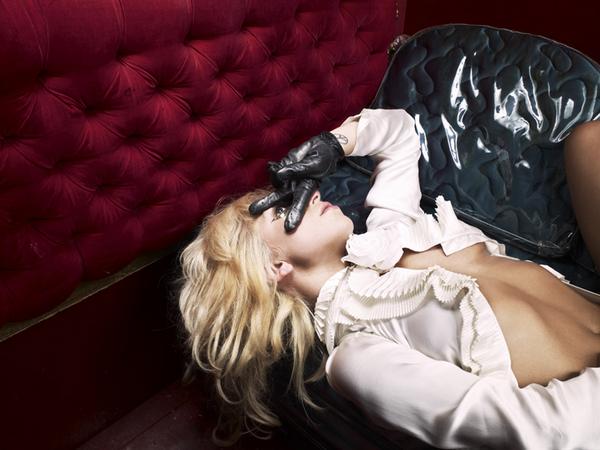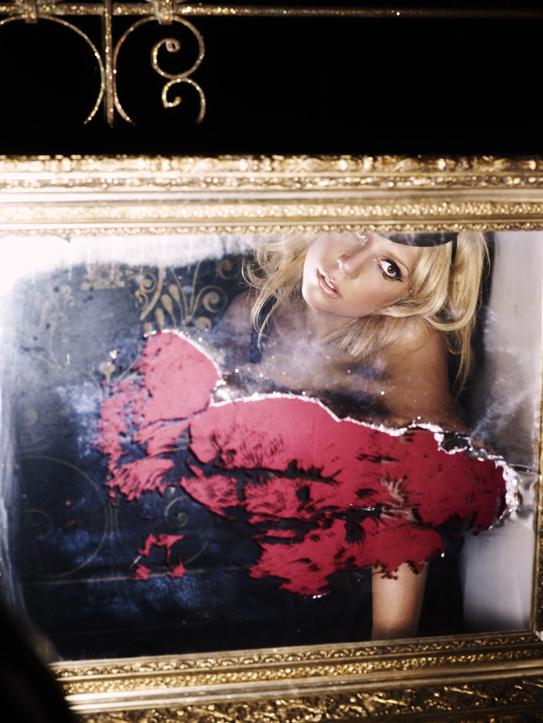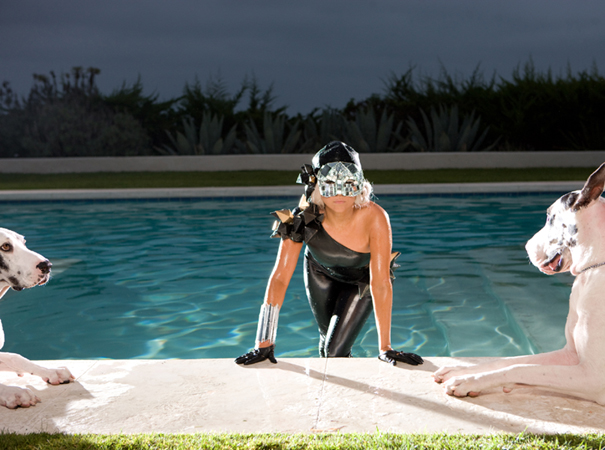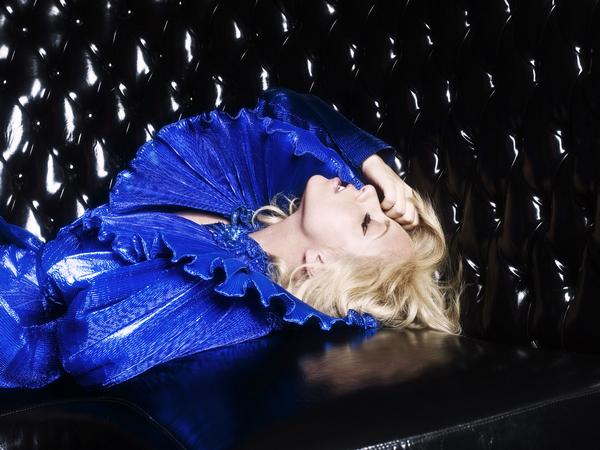“I’m a hustler, you know?” Lady Gaga
says. “I just keep going.”
She is going... and she’s planning on going
far.
Growing up in New York, Stefani Gabriella
Germanotta – who now goes by the stage name Lady Gaga – was steeped in
the celeb culture, watching famous classmates going to all the best
parties and dodging paparazzi.
Wanting a little of that glamour herself,
Gaga threw herself into music – a giddy marriage of dance club beats and
rock attitude. She was accepted at the Tisch School of Arts at NYU at
only 17 – though she eventually dropped out. Gaga started out at open
mike nights at places like the famed Village club The Bitter End, and
quickly grew a buzz on the scene, soon becoming an underground fave of
the Manhattan nightlife.
The buzz got so hot that Gaga soon was a
desired songwriter-for-hire, penning tunes for The Pussycat Dolls, New
Kids on the Block and the upcoming Britney Spears CD.
She was
just as quickly signed
to the label of popular rapper Akon (with whom Gaga has also written).
The first fruits of her efforts is
The Fame – a
dance concept album about the search for notoriety. With an
intoxicating mix of old-school beats and surprising glam rock tendencies
she creates a glorious gumbo of sound with touches of Bowie, Jackson,
C&C Music Factory, Madonna and Gwen.
About a week before
The Fame
was to be released, Gaga
sat down with us to talk about her music and her obsession with the
glamorous life.
 I
read in a bio of yours that you went to a private school at a convent.
I
read in a bio of yours that you went to a private school at a convent.
Yeah. I went to the Convent of Sacred
Heart, a private school in New York.
That isn’t the
background one would picture when listening to your music. Do you think
that experience affected your musical style and image?
Well, I think that actually it does kind
of fit. In a way, from a sound perspective…. My sound is very
forward-thinking and underground. It’s pop, but it’s futuristic and
artistic. But the subject matter is the fame. There were a lot of
girls that were in the public eye that went to my school, so I was
surrounded by it. I was sort of like a nerdy theater kid. So, if
anything, I disagree a little bit. I consider myself to make pop art
music. Even though it might not sound like it came out of a convent,
I think my education growing up in that environment made me able to
write about a decidedly shallow concept in a really intelligent way.
You have an
unusual stage name. I had read it was a reference to Queen’s “Radio
GaGa.” Is that true?
Yeah, it is. It was a nickname my
producer has for me.
You were
originally signed as a songwriter.
You have written songs for the
likes of the Pussycat Dolls, New Kids on the Block and now for Britney
Spears.
I love it. It’s so much fun… and a total
privilege.
As a performer, is it a little
weird to see other people recording your songs?
No, it’s awesome. It’s so great.
“Just Dance”
has became something of a hit. How surreal was it when you started
showing up on radio and TV and stuff?
It’s crazy. It’s awesome,
it’s fun… but do you know what’s so interesting? Because I’ve been
doing this so long, it feels like it’s time.
One
of the great things about The Fame is that it has lots of
different styles mixed in – R&B, dance like “Paparazzi,” hip hop like
“Poker Face,” glam rock like “Again, Again,” ballads like “Eh, Eh.”
Were you looking to experiment with styles when recording it or is that
something that comes naturally to you?
Thank you. It really comes naturally to
me. I did the record over a period of a few years, so I just changed
and I grew. When it came time to put all the songs on the record, I
felt like I had a lot of hits, but they all came from different parts of
my life. I thought, why limit myself to just putting all synth-electro-pop
records on here? Let me give everybody a real record. A real body of
work.
 Many of the
songs – such as “The Fame,” “Beautiful Dirty Rich” and “Paparazzi” are
about the glamorous life. Why does that intrigue you?
Many of the
songs – such as “The Fame,” “Beautiful Dirty Rich” and “Paparazzi” are
about the glamorous life. Why does that intrigue you?
What it’s really touching on is this
idea of fame and how it affects us as a culture. I’m
22 years old. I’ve been writing this record since I was nineteen. For
me, that’s a big part of my culture – my club culture. Celebrity life.
It’s the media and it’s the tabloids and it’s 23-year-old blondes
getting arrested. Why is this happening? Why do we love it? Why are
we slipping money into it? I was fascinated with it and I decided to
write songs about it. In a way, I thought that it was the most relevant
issue for me to speak to, that could really make an impact on young
people.
Another
recurring theme is hooking up in “Boys Boys Boys” and “Summerboys.” Why
do you think that a song about meeting people and picking them up in
clubs sort of resonates?
It’s because it’s about sex. Everybody
wants to hear about sex. That’s what all music is really about.
I was reading
that “Beautiful, Dirty, Rich” was going to be used for the series
Dirty Sexy Money. You’ve also had a couple of songs recently on
Gossip Girl.
Do you think television has become as important as radio to
get music out there?
Oh sure. I just got on the radio
in the past couple of weeks. We’re just starting to break at radio
now. It’s been a really long road. Television stuff is not easy to get
placed on, either. That’s more artistic than anything, because you are
putting the music with imagery. But, like I said, my music really
speaks to the modern culture. We’ve been really lucky. I’ve had more
than half the album licensed to television and movies.
Nowadays
musicians have so many more ways to reach out to their fans, the forum
on the official site, your MySpace page. What is it like being able to
reach the fans like that?
I love it. It’s the best.
 I
hear you are going to be touring with New Kids on the Block. The CD is
very good but it has a very well-produced studio sound. Will it be
tough to replicate in concert?
I
hear you are going to be touring with New Kids on the Block. The CD is
very good but it has a very well-produced studio sound. Will it be
tough to replicate in concert?
No, it’s not difficult to do it. And it
looks amazing! The show has super-innovative technology and fashion and
choreography. It’s really unlike anything you’ve ever seen before.
That’s my passion.
I heard
you performed at the Lollapalooza Festival last year. What was that
like?
That was two years ago.
Was it? Wait, maybe it was last year. Oh, it was last year. It feels
like forever
ago. It was last year.
The show is totally different now. I’m a different artist. I don’t
even know who that girl is. But, yeah, I performed there. I wasn’t
signed yet. I got booked on that show just based on my fan base in New
York.
What would
people be surprised to know about you?
I wrote every song on the album.
We have a big
election going on this year. Are you getting involved?
Yes.
 How so? Are
you doing benefits or anything?
How so? Are
you doing benefits or anything?
Well, I’m going to vote. Even though I’m
traveling around the world, I have my absentee ballot and I’m going to
vote.
What’s your
favorite movie or book?
Moonstruck is
my favorite movie. My favorite book is Letters to a Young
Poet by
Rainer Maria Rilke.
In the end, how would you like people to see your music?
As important.
Radio
playlists are so regimented these days. You used to be able to hear
rock, pop, country and soul on the same station and that just doesn't
happen anymore. Do you think that can make it tougher for a band to
find an audience?
I think that with radio formats it can be difficult, but
I played a show the other night in San Francisco, for a gay club. When
I got there, the club was packed and there were lines around the block –
thousands of people that couldn’t get in. When I went inside, it wasn’t
just a gay crowd. It was straight guys, gay guys, straight women, gay
girls. It was black guys, white guys. Black women, white women. Asian
community. Latino community. Everybody. I was like, I’m bridging
gaps. My music is reaching all different kinds of people. Even on a
gay night, everybody shows up. Today – actually, it’s so funny you
asked this – because today I got added to Z-100, which is like the
biggest station in the country. It’s been such a long road. It’s been
such a hustle to get this record played on the radio, because it’s so
different. But it’s a hit record, and a hit record breaks all the
rules. I was never going to give up on it and I still won’t. I think
at the end of the day, regardless of radio formats and regardless of
genre, I think that a hit record breaks every rule.